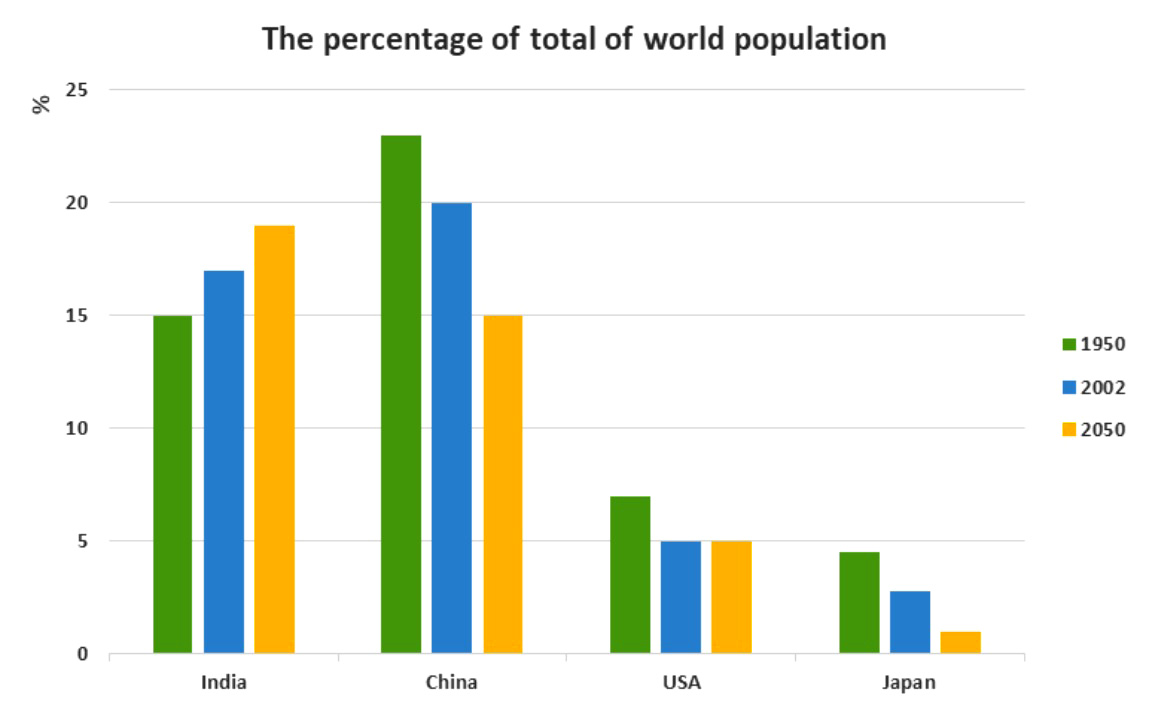The bar chart shows the percentage of the total world population in 4 countries in 1950 and 2003, and projections for 2050
Write at least 150 words.

For schoolchildren, their teachers have more influence on their intelligence and social development than their parents. To what extent do you agree or disagree?
Give reasons for your answer and include any relevant examples from your own knowledge or experience.
Write at least 250 words.
WRITING TASK 1
The bar chart illustrates the proportion of global population in four nations in two years 1950 and 2002, and also predictions for 2050.
It is clear that while the percentages of population in India increases, the reverse is true for the other countries over the period shown. Additionally, China and India have highest proportions of population, whereas the figure for Japan is by far lowest during the research period.
In 1950, China was the most populous nation with the figure registering around 23%, while the Indian population accounted for 15% of world population. In contrast, about 7% of people in the world were from the USA, compared to only less than 5% from Japan. In 2002, the rate of the Indian population rose slowly, while China, the US and Japan all saw declines in their figures.
In 2050, India is predicted to have the largest population as illustrated by an increase to nearly 20%. By contrast, the proportions of population in China and Japan are projected to decrease to 15% and about 2% respectively. Meanwhile, the figure for the USA is likely to remain the same, at 5%.
(188 words)
WRITING TASK 2
Both teachers and parents play a significant role in a child’s upbringing. In this essay, I will discuss why I disagree that teachers are a greater influence on the intelligence and social development of children than their parents.
The first few years of a child’s life are spent almost entirely in the company of their parental figures. These years are critical in the social development of a child, as they contain their first attempts to communicate with other people in order to receive the care and attention necessary for survival. Most school children start their education between the ages of four to seven years. Therefore, they have already experienced a considerable amount of parental influence before teachers are even introduced to them.
Other significant factors in the intelligence and social development of a child are the socioeconomic circumstances that they are brought up in. The quality of a child’s social life, schooling and health are all socioeconomic factors that heavily influence a child. These factors are a direct consequence of the circumstances brought about by the child’s parents. Better teachers will endow a child with greater intelligence and social skills, however, better teachers are, on average, found at better schools. The attendance of a child at a good school is usually the consequence of a decision made by their parents.
I believe that parents are a far greater influence on the intelligence and social development of children than teachers because, firstly, the early developmental years of a child’s life are almost entirely influenced by the company of their parents and, secondly, because the socioeconomic factors of a child’s life are usually a direct consequence of the factors which effect their parents.
(281 words)
